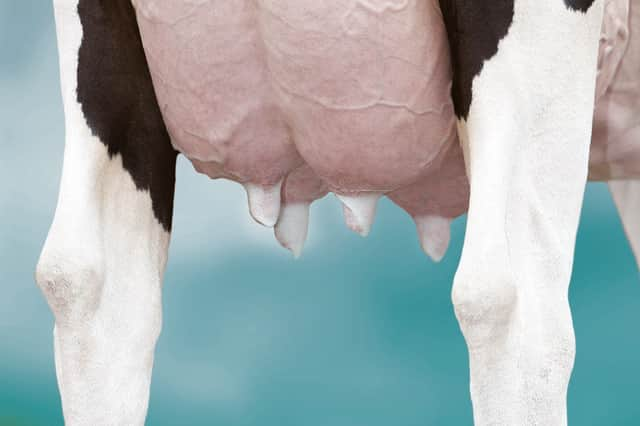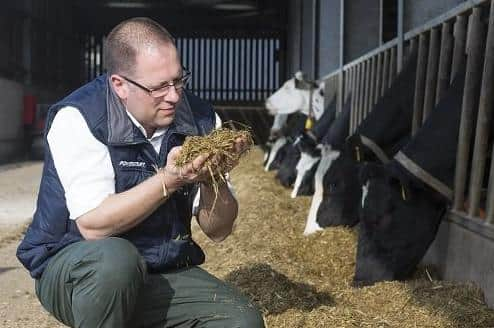Genus ABS: Caring for cows, communities, countryside and the climate!


The dairy and beef industries feel like they are taking the brunt of the criticism, and so much of that criticism is unfair based on poor science and even fiction.
‘Agriculture’ is suffering because it is made up of small, relatively fragmented, individual businesses who struggle to communicate with one voice. Others, like the Petro-chemical industry are multi-national conglomerates with influence and publicity machines that convince their audience that – despite overwhelming evidence to the contrary – they are in business for the public good, and for the good of the environment.
Advertisement
Advertisement
Somehow, each of us has a responsibility to ensure that the public better appreciates the completely natural process of an animal – millions of years in the making – who eats grass and converts it into nutritious meat that we can eat, or milk that we can drink, as compared to the unnatural processes involved in fossil fuel exploitation.


Agriculture is fragmented, but that doesn’t mean we can’t all play our part. We can all reduce our carbon footprint. Every day you can minimise the carbon footprint of your herd! It’s a lot to do with farming efficiently and it doesn’t have to be complicated either. Just making certain that each litre of milk produced is sold helps. Here’s how the products our customers’ use help them reduce their environmental impact.
Our industry leading Valiant udder care range can help reduce your carbon footprint
Every time one of your cows is treated for a case of mastitis and her milk goes unsold for several days, the environmental efficiency of your farm drops. Fewer litres are sold versus a relatively static carbon footprint. Keeping your cows healthy with low Somatic Cell Counts (SCC), low mastitis rates and all milk being sold is positive for the environment, as well as being great for your business. Put simply, 100% of your cows emit methane, etc. The cows whose milk you’re withholding from the tank are still emitters.
Advertisement
Advertisement
Where customers employ a complete ‘pre-milking’ routine – identifying mastitis cases early and using a good quality Chlorine Dioxide pre-foam – mastitis rates can be even lower than 2% per month. In other farms we know that mastitis rates can be much higher. With appropriate advice about product and routine, we regularly see Genus ABS customers maintaining low mastitis rates, operating at low SCCs and selling more clean, high quality milk.
We know that poor udder health is still one of the main reasons dairy cows leave herds prematurely. The cost of raising a heifer for two years only to see her leave the herd early after an extremely short productive life is massive. This cost is both financial and environmental. During her first two years of life she’s been an emitter but not a producer. The longer cows stay in your herd the more the productive years offset the early years. Playing our part in protecting you cows from bacteria that
can cause mastitis is central to our Valiant programme.
Using our range of silage additives also has a positive impact on the environment – and from several different perspectives:
Cows fed Powerstart-treated silage have fewer days open. A study of over 100 dairy herds in GB and Northern Ireland published in 2012 clearly showed that those herds eating Powerstart-treated silage saw a fertility benefit that meant that each cow got in calf an average of 10 days sooner. That means more cows at peak yield more often – producing more milk each day on average.
Advertisement
Advertisement
In addition, because the fermentation is faster, the silage you’re feeding is more nutritious. Each cow takes in more energy and she performs even better as a result, so her milk:emissions ratio is better.
A trend in recent data from Promar showed that cows eating Powerstart treated silage seem to stay healthier too. Vet and med costs were 12% lower on farms that used Powerstart to help make their silage. There is an obvious correlation between cows that enter the hospital pen and a decline in milk production. Importantly, cows in the hospital pen still emit methane etc!
Further work done at IBERS as part of the SMARTsilage project in 2019 showed that Powerstart treatment resulted in a 4% reduction in dry matter losses. Because there was more Powerstart-treated silage in the clamp to feed, it can be said that the production of Powerstart treated silage produced 4% fewer emissions per tonne than the untreated silage.
Genus ABS are doing their bit…
In 2006 each pack of our silage additive to treat 120 tonnes of grass included a 25-litre plastic drum.
Advertisement
Advertisement
Today, just 15 years on, almost all the silage additive we sell is plastic-free! That’s a reduction of thousands of plastic drums each year!
Being faced with a problem of the enormity of climate change can feel overwhelming but be assured, operating efficiently and keeping healthy cows performing at their best, will ensure you minimise your environmental impact per litre produced. The Northern Irish dairy and beef industries are already extremely efficient. We just have to get better at explaining and demonstrating that to our audience, ensuring that they better understand how we care for our cows, community, countryside and climate!